Facebook to label posts by state-controlled media
The social media giant is working on better transparency ahead of the 2020 election.

Facebook is adding labels to posts by state-controlled media globally.
Facebook says it'll label links that come from state-controlled media companies, in an effort to make it clear where people are getting their news from. It's because these news sources "combine the influence of a media organization with the strategic backing of a state," the social media company said Thursday. The company will also start labeling paid ads from media companies later this summer ahead of the 2020 US presidential election in November.
The labels will be applied globally, and they'll appear in your news feed this week, Facebook said.
To choose which outlets are getting labeled, Facebook consulted with more than 65 media, governance and human rights experts worldwide. For each media company, they looked at mission statements; ownership structures; editorial guidelines; newsroom leaders and staff; funding and revenue sources; accountability systems; and national laws protecting journalistic independence.
"Our definition of state-controlled media extends beyond just assessing financial control or ownership and includes an assessment of editorial control exerted by a government," Facebook said. "If we determine that there are enough protections in place to ensure editorial independence, we will not apply the label."
Similarly, in April Facebook added location information to posts by high-reach Facebook pages and Instagram accounts. Facebook and Instagram are testing the feature in the US, targeting accounts and pages based outside the states that have big audiences inside the country.
By swiping up on a post or page, you'll see a message like this: "This account and many of its followers are based in different locations" or "Account based in Brazil."
Facebook has come under fire in the last week for refusing to fact-check or put warning labels on posts by US President Donald Trump. This followed Twitter applying a fact-checking label that flagged "potentially misleading information" to a tweet by Trump that said mail-in ballots for the November election would be "substantially fraudulent."
Also last week, Twitter labeled a tweet by the president about protests in Minnesota over the death of George Floyd in police custody. This time, Twitter screened out Trump's tweet with a warning label that says the post violates the site's rules about "glorifying violence." Users can click a View button in the warning to go ahead and read the tweet.
Facebook CEO Mark Zuckerberg took no action on the same posts, saying social media platforms shouldn't be fact-checking the president. On Tuesday, he defended his refusal to take down or flag any similar posts despite being slammed by civil rights leaders, and despite some Facebook employees staging a protest Monday.

